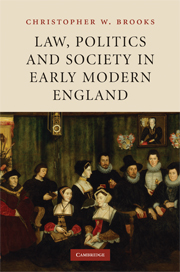Book contents
- Frontmatter
- Contents
- Preface
- Abbreviations and conventions
- 1 English history and the history of English law 1485–1642
- 2 Courts, lawyers and legal thought under the early Tudors
- 3 The initiatives of the crown and the break from Rome
- 4 Political realities and legal discourse in the later sixteenth century
- 5 The politics of jurisdiction I: the liberty of the subject and the ecclesiastical polity 1560 – c. 1610
- 6 The politics of jurisdiction II: multiple kingdoms and questions about royal authority
- 7 The absoluta potestas of a sovereign and the liberty of the subject: law and political controversy in the 1620s
- 8 The degeneration of civil society into a state of war 1629–1642
- 9 Law and ‘community’
- 10 The aristocracy, the gentry and the rule of law
- 11 Economic and tenurial relationships
- 12 The household and its members
- 13 The person, the community and the state
- 14 Conclusion
- Manuscript bibliography
- Index
- References
8 - The degeneration of civil society into a state of war 1629–1642
Published online by Cambridge University Press: 06 July 2010
- Frontmatter
- Contents
- Preface
- Abbreviations and conventions
- 1 English history and the history of English law 1485–1642
- 2 Courts, lawyers and legal thought under the early Tudors
- 3 The initiatives of the crown and the break from Rome
- 4 Political realities and legal discourse in the later sixteenth century
- 5 The politics of jurisdiction I: the liberty of the subject and the ecclesiastical polity 1560 – c. 1610
- 6 The politics of jurisdiction II: multiple kingdoms and questions about royal authority
- 7 The absoluta potestas of a sovereign and the liberty of the subject: law and political controversy in the 1620s
- 8 The degeneration of civil society into a state of war 1629–1642
- 9 Law and ‘community’
- 10 The aristocracy, the gentry and the rule of law
- 11 Economic and tenurial relationships
- 12 The household and its members
- 13 The person, the community and the state
- 14 Conclusion
- Manuscript bibliography
- Index
- References
Summary
Subjects or slaves?
Writing within the privacy of his study in the 1610s, Sir Anthony Benn concluded that there was no need to worry that strong monarchical government would lead to tyranny. All the ‘hartburning and the quarrell’ in his day was about nothing more than ‘money tribute, taxes and impositions’. It was not about ‘our lives, nor our liberties, nor that our sonnes are to be made slaves’. One wonders, therefore, how he would have described the later 1620s, when according to many a speech in parliament, and a fair number of courtroom briefs, the liberty of the subject was in great peril. Indeed, one of the most recurring rhetorical devices in the parliamentary debates of 1628 and 1629 probed the heart of the relationship between subjects and monarchical states: a people whose property could be taken from them at the will of the monarch were slaves, not subjects. Or, to put it in tenurial terms familiar in English land law, they were serfs or villeins rather than free tenants whose rights to property were protected by law.
First enunciated in a parliamentary setting during the Impositions debates, by the late 1620s this formula was as likely to fall from the lips of laymen such as Sir Dudley Digges as it was from lawyer MPs such as Sir Edward Coke. Although it can be found in works within the English legal tradition such as Bracton, it was probably more familiar outside the courtroom than within it.
- Type
- Chapter
- Information
- Law, Politics and Society in Early Modern England , pp. 190 - 240Publisher: Cambridge University PressPrint publication year: 2009

